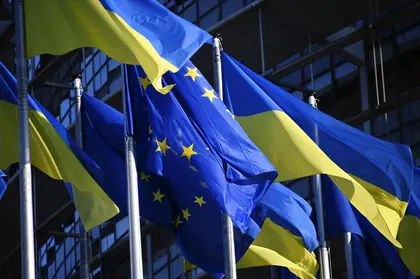The EU on Thursday, Dec. 15, cleared the way to giving Ukraine 18 billion euros ($19 billion) in aid and agreed a minimum corporate tax after last-minute Polish objections held up a deal, diplomats said.
The move followed an impassioned plea from Ukrainian President Volodymyr Zelensky not to let internal disputes within the 27-nation bloc stand in the way of backing Kyiv.
JOIN US ON TELEGRAM
Follow our coverage of the war on the @Kyivpost_official.
"I am asking you very much to ensure that our struggle for peace for Ukraine and for the whole of Europe does not depend on misunderstandings and controversies between some EU member states," Zelensky said in a video address to EU leaders meeting in Brussels.
The 27 member states had struck a complex agreement on Monday that gave the green light to both the Ukraine aid and a minimum 15 percent global corporate tax rate.
The so-called "megadeal", which included a compromise with Hungary over frozen EU funds, was formally expected to be approved on Wednesday evening.
But repeated deadlines to ratify the package slipped by after Warsaw raised objections to the tax push.
The delay meant the wrangling spilled over into the EU leaders summit.
Diplomats said an accord was eventually found after Poland agreed to let the initiatives go through.
Warsaw -- one of the most hawkish supporters of Ukraine inside the EU -- had insisted it was firmly in favur of the 2023 financial aid for Kyiv.
But Prime Minister Mateusz Morawiecki said it was "blackmail" for other countries to maintain the money for Ukraine could only be agreed if the corporate tax deal went through.

Putin Hints Precondition for Peace Talks: Neutered Ukraine
The hitch came as Poland looks to persuade the EU it has made enough progress on reforms to justify it starting to receive $35 billion in post-Covid recovery funds.
The desperately-needed funds will help prop up the Ukrainian government next year as its struggles to keep services going in the face of Russia's war.
In a separate disagreement, Poland and Lithuania were also objecting to a new package of sanctions on Russia over the war in Ukraine, arguing other EU nations had tried to water it down too much.
Eastern european officials said attempts by coastal states including Belgium and the Netherlands to roll back restrictions on Russia selling fertilisers would weaken EU attempts to punish the Kremlin.
You can also highlight the text and press Ctrl + Enter










